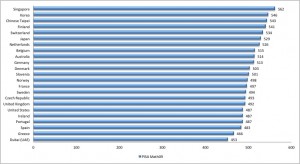Education has been given the task to turn our children into globally competitive workforce. It is thus no surprise that results of international assessments such as the PISA and TIMSS are closely watched by policy makers and the media as an indication a nation’s education quality and their future competitiveness. While I have serious reservations about making “global competitiveness” as an honorable purpose of education and the reduction of complex phenomenon such as education and human capacity into simplistic numbers, I am unable to resist the seduction of numbers and rankings. In doing research for my new book
World Class Learners: Educating Creative and Entrepreneurial Students, I came across a set of data that appear to show something very interesting.
The
Global Entrepreneurship Monitor (GEM) is annual assessment of entrepreneurial activities, aspirations, and attitudes of individuals in over 50 countries. Initiated in 1999, about the same time when PISA began, the GEM has become the world’s largest entrepreneurship study. Thirty-nine countries that participated in

